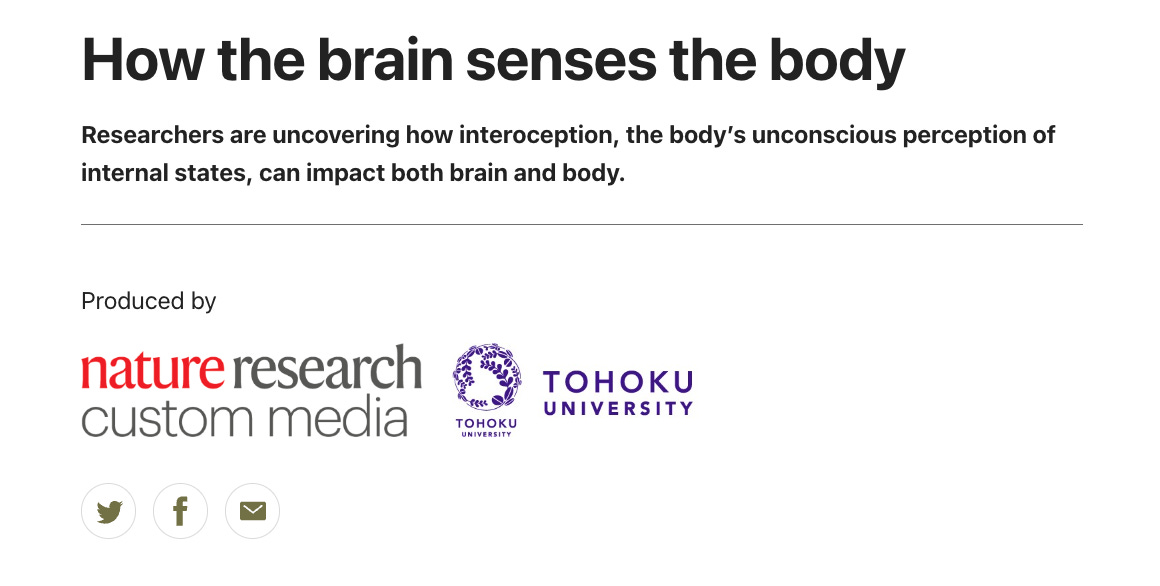Food for Thought: Eating Disorder News You Should Know About
Week of 10-4-2024 includes Demi Lovato, a popular UK Netflix show, research on binge eating disorder, Ozempic (of course), and an article on the brain
Happy Friday from Chicago ya’ll!
I’ve been in Canada, Michigan, and New York City in the past 10 days which is honestly just par for the course in my life of roaming. But, man, the mid-30s really hit ya at times as I soothe my aching back while I type.
Here’s a pic of Niagara Falls last weekend to remind me it’s still always worth it :)
I love my van, but seemingly no van influencer talks about the physical effects of sitting in a drivers seat for far too long between one place and another. Takes a toll and this next few weeks I’m committed to stretching better.
Which, PS, any of y’all going to Las Vegas for ‘When We Were Young’ Festival Oct 18-20??? Shout out my fellow emo 00 high schoolers. I’m going with my bro and sister-in-law, dressed in platform boots and fishnet, embracing the war-torn heart that is your high school era with the bands that sang to my soul. If you’re gonna be there, LMK.
Also, if you live or are going to be in Kansas City at the end of October, feel free to reach out! It’s my grandmothers 90th and I’m going to be there early to hang and happy hour with her (as we do). Some may find it odd but I absolutely bloody love hanging out at her assisted living facility. Her friends are a hoot, the romance drama amongst 80-90 year olds is soap opera worthy, and it’s just a safe haven from the real world. Like an alternate reality of sorts.
Anywho, circling back to the point of this post. If you are looking for personal anecdotes on eating disorders or recovery, check out my latest post before this on egg freezing and the surprising aftermath on my eating disorder (oddly… positive?!)
Alright, onto the point…
This week, here’s what you should know about eating disorders:
Here’s a couples entertainment/cultural pieces to kick us off:
This Billboard article by Hannah Dailey on “Demi Lovato Opens Up About Ongoing Eating Disorder Treatment: ‘This Body Saved My Life’
Regardless how you may feel about Demi (I really have no opinion whatsoever, you do you, be human) — I do appreciate how much they’ve spoken publicly about recovery and eating disorders in general. In the latest episode of Podcrushed, Demi Lovato opened up to Penn Badgley (of all people?) about their ongoing journey with body image, eating disorder recovery, and gender expression. Lovato, who has been in recovery from bulimia for nearly six years, shared that they work closely with a treatment team, including a nutritionist and therapist specializing in eating disorders. I thought this was interesting:
“Rather than focusing on body positivity, Lovato said they are learning to embrace body acceptance, explaining, “This body saved my life and fought for my life when I overdosed."
They also discussed how cooking meals at home has become an empowering act in their recovery process, which I do totally understand that sentiment so it was nice to read it from a celeb’s POV though I do imagine Demi has a team of people who cook for them as needed lol. The interview coincided with the release of Lovato’s Hulu documentary Child Star, which explores the challenges of growing up in the spotlight. I’d love to see it personally, I can’t even begin to imagine what it feels like growing up in that kinda spotlight.
This Pink News article by Marcus Wratten on “Heartstopper’s eating disorder storyline is groundbreaking TV: ‘Not only young girls affected’
Alright y’all — so I haven’t seen this, but it’s on my list for this weekend of lounging. Apparently, finally, my god LET IT BE TRUE: Heartstopper season three has brought much-needed attention to eating disorders, particularly anorexia, in young LGBTQ+ men through one of the lead characters Charlie. Which, hell yeah. Finally, a show apparently doing it well (?!)
The UK charity Beat praised the show for its more accurate portrayal of Charlie's struggle, as well as the supportive role his boyfriend Nick plays. The storyline helps correct the common misconceptions we know exist, emphasizing that eating disorders affect more than just girls, and shows the importance of early intervention and seeking help. The article also explores how Heartstopper offers a more accurate, sensitive portrayal of recovery, which is often nonlinear, and asks viewers to recognize the signs of eating disorders and offer compassionate support. Have you seen it? LMK your thoughts.
THIS New York Times article by Dani Blum on “Can Drugs Like Ozempic Treat the Most Common Eating Disorder?”
Doctors are already using weight loss drugs to treat binge eating disorder. But some experts warn that it’s a Band-Aid, not a fix.
Unsurprisingly, there’s a growing interest in using weight loss drugs like Ozempic to treat binge eating disorder, the most common eating disorder in the U.S. People who take these drugs often report that their obsessive thoughts about food, or "food noise," quiet down, which researchers believe could help curb the compulsive behaviors associated with binge eating. Although evidence is mostly anecdotal, early studies show promising results. However, experts caution that addressing binge eating requires more than just hunger control, as underlying emotional issues often contribute to the disorder. Some fear that relying solely on these medications might lead to other disordered eating patterns. Other doctors say they’re worried that the medications can hijack hunger cues to the point where people have no appetite at all. That can be especially troubling for people with binge eating disorder as they try to get in tune with their own hunger cues. Instead of learning to stop eating when they are satiated, patients who take these drugs may just barely eat, effectively trading one type of disordered eating for another.
Hot Take: Doctors are also reporting some patients with eating disorders become malnourished from consuming too little food while on drugs like Ozempic. (I’m biased admittedly, but feels like many in the ED field have all predicted this.)
Here’s a little eating disorder research published on Brain & Behavior Research by Kristin N. Javaras, D.Phil., Ph.D. on “Binge Eating Disorder, Often Untreated, Typically Persists for Years, With Infrequent Remissions, Study Finds”
Recently, the DSM-5 has updated its diagnostic criteria for BED to require one or more binge episodes per week over three months, compared to the DSM-4's two days per week over six months. A new study led by Dr. Kristin Javaras of McLean Hospital and Harvard Medical School focused on the natural course of BED, exploring patterns of remission and relapse. The study, which followed 137 individuals over five years, found that while many showed improvement, full remission was rare. At 2.5 years, 61% of participants still met the criteria for full BED, with that number decreasing to 45% at five years. Using the updated DSM-5 criteria, the percentages were even higher, with only 15% in remission at 2.5 years and 22% at five years.
Despite the challenge of remission, treatments such as cognitive behavioral therapy (CBT) and interpersonal psychotherapy (IPT) continue to show effectiveness in helping people with BED regain control over their eating. Lisdexamfetamine, the only drug approved for BED, has led to remission in up to one-third of patients. However, the long-term success of these treatments and which patients benefit most remain open questions. Dr. Javaras and her team are now using neuroimaging to better understand the biology of BED in hopes of improving treatments and detecting the disorder earlier.
Hot Take: Many people with BED do not seek treatment, which really just underscores the need for increased awareness about what BED is, as well as accessibility of effective therapies.
For all my brain-loving readers, this Nature article on “How the brain senses the body” and you can check out the references here
Alright, so this one’s a little over my head at times so if you see an error here - correct me. The article focuses on Interoception, which is the brain's ability to sense internal bodily signals like hunger and fullness, and plays a crucial role in eating disorders. Disruptions in how the brain processes these signals, particularly through the vagus nerve, can lead to disordered eating behaviors such as bingeing or restricting. Research into interoception, including the role of the vagus nerve and its connection to the insular cortex, is shedding light on how brain-body communication affects feeding behavior and emotional regulation. This understanding may lead to new treatments that target these pathways to help manage eating disorders.
Hot Take: New treatments targeting interoception and the brain-body communication pathways, such as the vagus nerve, could include interventions like vagus nerve stimulation (VNS) and biofeedback techniques. VNS, already used for conditions like depression and epilepsy, involves mild electrical stimulation of the vagus nerve, potentially helping to regulate disrupted interoceptive signals and improve emotional and physical responses to hunger and fullness. Additionally, mindfulness-based therapies focused on improving interoceptive awareness could help individuals with eating disorders better recognize and respond to internal body cues, reducing disordered eating patterns. Cognitive behavioral therapies (CBT) that incorporate interoception may also help rewire how the brain interprets these bodily signals, improving emotional regulation and body awareness.
Alright, what am I missing?? Did you see anything this week or last that I should include in my next edition?
Feel free to share & comment. You know I love chatting.







Heartstopper is AMAZING. I have watched 2 people I know well become underweight on ozempic and now have developed an eating disorder as a result of this needing to stay thin (although there’s so much more to it), yet I’ve read that it has saved so many people with bulimia and allowed them to recover. Hard to know especially since the drug is so new - we don’t know the long term side effects. Physical, psychological, societal. Thanks for sharing, Lindsey.